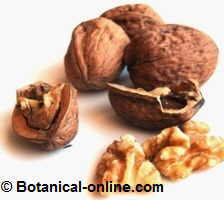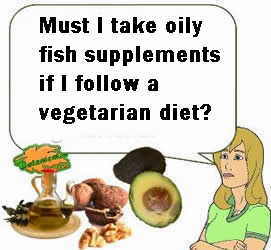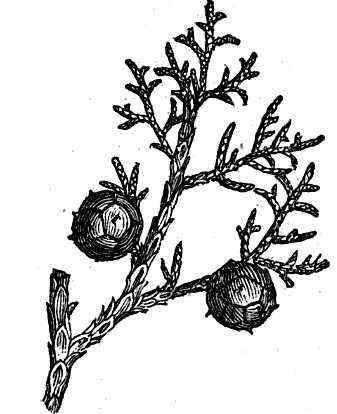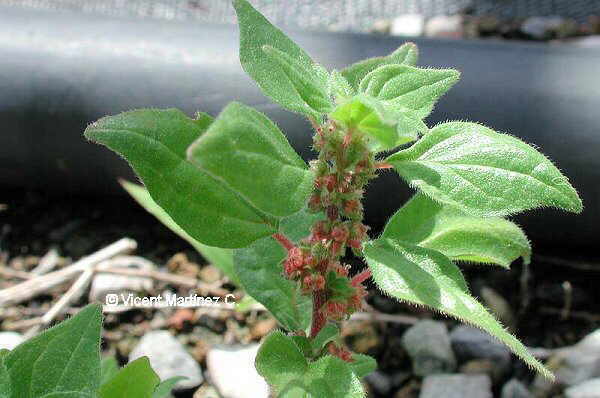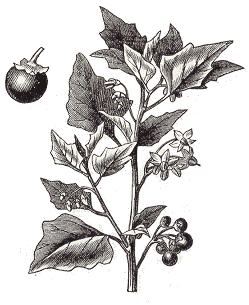Contents
- 1 Supplements of Omega 3 and vegetarian diet
- 1.1 OMEGA 3 EPA and DHA IN VEGETARIAN DIET
- 1.2 What is omega 3?
- 1.3 What are EPA and DHA?
- 1.4 What are EPA and DHA used for?
- 1.5 Is it necessary to take supplements of EPA and DHA if I am vegetarian?
- 1.6 Sometimes supplements may be recommended…
- 1.7 Problems with the metabolism of EPA and DHA
- 1.8 Foods containing EPA and DHA
- 1.9 Do vegetarians have deficiency of EPA and DHA?
- 1.10 Do you need to eat oily fish or buy supplements?
- 1.11 General recommendations and for vegetarians
- 1.12 Omega 3 EPA and DHA supplements for vegetarians
Supplements of Omega 3 and vegetarian diet
OMEGA 3 EPA and DHA IN VEGETARIAN DIET
What is omega 3?
Omega 3 is an essential fatty acid found in large amounts in nuts and seeds, especially flaxseed meal, in walnuts and ground chia seeds.
Walnuts are rich in omega-3 essential fatty acids |
This type of fat is used by the body to manufacture anti-inflammatory substances and to form more elastic blood vessels.
Taking enough omega 3 increases the good cholesterol, prevent atherosclerosis (plaque) and decreases the risk of heart disease.
What are EPA and DHA?
EPA and DHA are a type of fats from omega 3 family. That is, fatty acids that the body produces from omega 3 from diet.
In the liver, our body converts some of these omega-3 fats in some substances called eicosanoids, which are the fats called EPA and DHA. Oily fish is the only food that provides high doses of these components, which are not found in vegetarian diets.
What are EPA and DHA used for?
Among its functions, EPA acts primarily on the cardiovascular system: It is a powerful blood fluidizer, which improves insulin resistance and control of blood pressure, and increases good cholesterol.
DHA fats effects are more focused on the nervous system, where they are in great concentration as part of neurons. They are fats necessary to improve memory and concentration, and also in pregnancy, during the formation of the fetal nervous system. These fats can have benefits on hyperactivity, mild depression, and in some diseases of the nervous system.
In food, only oily fish contains much EPA and DHA.
Is it necessary to take supplements of EPA and DHA if I am vegetarian?
No need to take supplements in healthy people |
No, vegetarian healthy people do not need to take supplements of omega 3 EPA and DHA because these substances can be produced from omega-3 fats, sufficiently and naturally by your body.
However, it is advised to take foods rich in omega 3 daily, for example, 7 walnuts daily or 2 teaspoons ground flax every morning.
Sometimes supplements may be recommended…
In some cases it is advisable to take supplements, besides food rich in omega 3 previously mentioned.
You can purchase vegetarian DHA supplements (originating from seaweed). For example, if there is heart disease, poor circulation, etc. (Consult your doctor)
Problems with the metabolism of EPA and DHA
Although EPA and DHA can be synthesized in our body, some factors may block the transformation of omega 3 EPA and DHA in the liver. (The enzyme delta-6 desaturase is inhibited).
These are: alcohol, tobacco, trans fats, excess saturated fat, and some medications (anti-inflammatory drugs, contraceptives, etc.).
For this reason, some experts believe that EPA and DHA are essential fatty acids, so they should be taken directly from oily fish or supplements, in the case of vegetarian diets.
Foods containing EPA and DHA
Plant foods do not contain EPA or DHA, except for some seaweed, but in very low amounts.
Bluefish is the only significant source of EPA and DHA fatty acids, which do not need any transformation in the liver. Cold-water fish are rich in these components, because they are potent blood thinners, which acts in these animals as natural antifreeze.
Vegetables, vegetable oils, nuts, seeds of cereals and oilseeds contain omega 3 linolenic acid that will be converted in the liver into EPA and DHA.
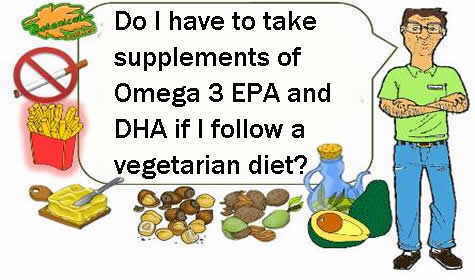
Healthy vegetarians need not to take omega-3 supplements EPA or DHA because these substances can be produced from omega 3. However, they are advised to take other foods rich in omega-3 daily. In some cases supplements are highly desirable.
Do vegetarians have deficiency of EPA and DHA?
Vegetarians do not have EPA or DHA deficiency because their body produces it naturally.
The lack or deficit of EPA and DHA may occur both in vegetarian diets, as in omnivorous diets, when not sufficient omega 3 is provided.
Do you need to eat oily fish or buy supplements?
No, bluefish is not essential in the diet and neither is taking DHA supplements to provide these components.
It is possible to take a complete diet without eating fish without having to use supplements of fish oil omega 3 EPA and DHA. As explained above, the body can manufacture them from contributing omega3 plant foods.
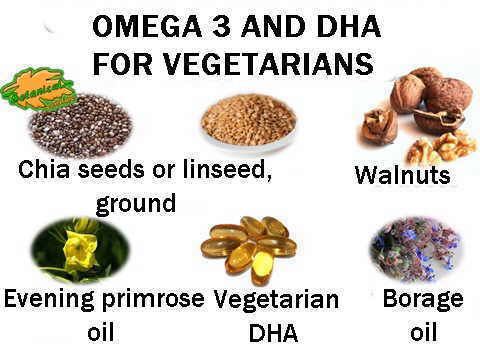
Summary sheet with food and supplements of more advisable omega 3 for vegetarians.
General recommendations and for vegetarians
In a vegetarian diet, people who do not take enough oily fish, to ensure the supply of omega 3 diet, are advised to consume any of these foods rich in omega-3 daily:
– 2 teaspoons ground flaxseed
– 2 teaspoons ground chia seeds
– 7-8 walnuts (14 halves)
It is also recommended to avoid the factors preventing the transformation of omega-3 EPA and DHA, which are those already mentioned above: tobacco, alcohol and foods with trans fats.

Vegetarians are recommended adding seed ground flax or chia to their recipes
Omega 3 EPA and DHA supplements for vegetarians
Supplements should be taken according to the dosage or quantities indicated on the package. It is not recommended to exceed the recommended dose unless directed by your doctor:
There are vegetarian DHA supplements (derived from algae).
Flaxseed oil is rich in omega 3 (linolenic acid), but it requires a transformation in the liver to become gamma linolenic acid (GLA) and later in EPA and DHA, so supplements mentioned above are more effective.
*Related information:
– When is it recommended to supplement with omega-3?
![]() More information on Omega essential acids.
More information on Omega essential acids.

